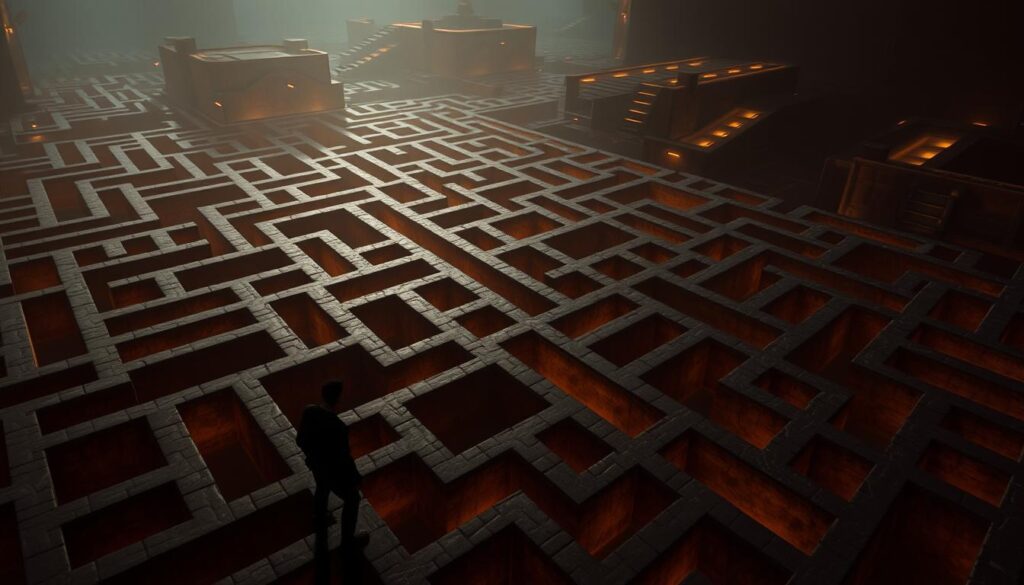Ever wondered how mobile games create vast, detailed worlds? They use a Smart Cache System to make navigation smooth. This is key as mobile gaming grows. It’s vital for developers and players to grasp these advanced methods.
This article explores procedural labyrinths and the role of smart caching. It shows how these technologies improve the mobile gaming experience. They make games more enjoyable and easy to navigate.
Introduction to Navigation Optimization in Procedural Labyrinths
Navigation Optimization is key to better gaming in procedural labyrinths, especially on mobiles. These places have changing, detailed layouts that are hard to navigate. Unlike fixed levels, procedural labyrinths change as you play, making paths unpredictable.
Players struggle to find their way in these shifting mazes. This makes the game less fun as they spend more time searching. Using smart caching can help, making it easier to move around and enjoy the game more.

Advanced systems help make navigating these labyrinths easier. With good caching, games run smoother and players are happier. This keeps the game exciting without any breaks.
The Importance of Mobile Navigation Technology
Mobile navigation technology is key to better gaming experiences. It affects how players play, how devices perform, and how much they enjoy the game. As games get more complex, better navigation is more important than ever.
Advanced mobile navigation lets gamers move easily through detailed worlds. Good navigation tools make games more fun and immersive. Players feel more connected and stay engaged longer.
New tech in gaming has improved navigation. Developers use these tools to make games smoother and more enjoyable. This not only makes games better but also helps devices run faster and show better graphics.
| Feature | Impact on User Experience | Contribution to Gaming Technology |
|---|---|---|
| Intuitive Controls | Enhances ease of use, reduces player frustration | Informs design choices for user-friendly interfaces |
| Real-time Feedback | Increases player involvement, accelerates learning curve | Promotes real-time interactions with game environments |
| Dynamic Pathfinding | Offers flexible navigation routes, increases exploration | Advances AI algorithms for smarter game design |
The mobile gaming world is growing fast. Good mobile navigation is more important than ever. Developers must keep games engaging with better navigation. The future of mobile gaming depends on these navigation systems.

Understanding Procedural Dungeons and Their Complexity
Procedural dungeons are a big step in game design. They create worlds that change on their own, thanks to algorithms. This means players always find something new, making the game exciting and fresh.
The complexity of these dungeons makes them a challenge. Players need strategy and skill to navigate them. It’s not just about moving from point A to point B.
Procedural dungeons have unique layouts that change every time. This makes each player’s experience different. It also brings its own set of challenges for game developers.
Developers face the task of making these dungeons easy to navigate. They must balance randomness with a sense of direction. This ensures players feel they’re in control.
By using smart design, developers can overcome these challenges. This leads to games that are more engaging and fun. Players will want to play again and again.
Smart Cache System for Navigation in Procedural Dungeons
The Smart Cache System is a big step forward in making navigation in procedural dungeons better. It uses smart caching to keep important data that helps players move around easily. This is especially important in mobile games, where there’s less power and speed is key.
Overview of the Smart Cache System
The Smart Cache System works by saving game data that players often need. As players move through dungeons, it updates the cache with things like paths, enemy spots, and changes in the environment. This makes moving around the game much smoother, with less lag and quicker responses.
Benefits of Using a Smart Cache System
Using a Smart Cache System brings many benefits that make the game better and more fun:
- Improved Navigation Speed: Fast access to data helps players make quick decisions while exploring.
- Reduced Computational Load: It cuts down on the need for repeated calculations, keeping the game running smoothly.
- Enhanced Player Satisfaction: Better gameplay means players have more fun, leading to more time spent playing.
Key Techniques for Navigation in Mobile Games
In mobile games, two techniques are key for a better player experience. SLAM (Simultaneous Localization and Mapping) and Deep Reinforcement Learning are at the forefront. They help players explore complex environments more efficiently, making games more fun and immersive.
SLAM (Simultaneous Localization and Mapping)
SLAM is vital for understanding surroundings in real time. It helps players move through changing labyrinths better. By mapping and tracking the player’s location, SLAM reduces navigation errors.
This leads to a smoother experience as players explore new and changing game worlds.
Deep Reinforcement Learning Algorithms
Deep Reinforcement Learning improves navigation strategies in mobile games. It learns from player actions and environmental changes. This ensures navigation stays smooth.
As players face different paths and obstacles, Deep Reinforcement Learning makes quick adjustments. This keeps the game engaging, especially in complex environments.
Challenges in Navigating Procedural Labyrinths
Navigating procedural labyrinths is tough for gamers and developers. These complex environments bring big challenges. It’s key to look at what makes it hard to navigate.
Dynamic Obstacles in Game Environments
Dynamic obstacles make things unpredictable. They can move or change shape, needing players to keep adjusting. Without good navigation tools, gamers might get stuck or frustrated.
Developers must plan for these changes. This way, they can make games that keep players interested and moving forward.
High Computational Complexity of Navigation Algorithms
Navigation algorithms are complex and require a lot of work. They help with movement and finding paths. But, they also slow down games.
It’s important to make these algorithms work better. This way, games can run smoothly, even in detailed worlds. Solving these problems helps make games more fun and responsive.
Benefits of Smart Cache Implementation
Using a Smart Cache System in procedural dungeon navigation brings many benefits. It makes games run smoother and faster. This means players can jump into action without waiting.
Navigation Efficiency is key to keeping players interested. With better caching, controls work faster and more smoothly. This makes the game feel more real and fun, leading to happier players.
Games that run well thanks to Smart Cache keep players coming back. Happy gamers tell their friends about the great experience they had. This word-of-mouth helps games grow in popularity.
Exploring the Integration of Smart Cache in Game Development
Smart Cache is key in making game navigation smoother. It uses ROS 2 to improve how games move through levels. This part talks about how developers use ROS 2 and testing to make Smart Cache work well.
Utilizing ROS 2 for Navigation Optimization
ROS 2 is great for making smart navigation in games. It helps manage data flow and processing. This means games can adapt quickly, keeping players moving smoothly through levels.
Using ROS 2 fits well with Smart Cache. It helps get important navigation data fast. This is especially useful in complex game worlds.
Testing and Validation Procedures
Testing is crucial for Smart Cache to work right. Developers need to test it under different conditions. They check how well it handles changes in the game world.
They look at how fast, accurate, and reliable the navigation is. By testing carefully, developers can fix problems early. This makes the game better for players.
Case Studies on Smart Cache Optimization
Smart Cache Optimization has made a big difference in mobile games. It helps players move through complex levels faster. Many Case Studies show how smart caching has improved game play.
In one example, an action-adventure game used Smart Cache Optimization. It cut down load times by 40%. This made it easier for players to explore detailed worlds, making the game more fun.
Another study was on a popular RPG. Smart caching cut down on the work needed for pathfinding by 30%. This allowed for quicker and more interactive gameplay.
A racing game also benefited from Smart Cache Optimization. It improved how fast the game ran and cut down on delays. This made racing smoother and more enjoyable.
The table below shows the main points from these studies. It highlights the different strategies and results:
| Game Type | Optimization Strategy | Outcome |
|---|---|---|
| Action-Adventure | Dynamic Cache Loading | 40% reduction in load times |
| RPG | Real-time Pathfinding Caching | 30% decrease in computational costs |
| Racing | Smart Track Caching | Improved frame rates and reduced latency |
Future Developments in Navigation System Technology
The world of navigation technology is set for big changes thanks to new Future Technology. Developers are using AI to make games better for players. They’re looking at what’s new in Mobile Game Trends to improve how we navigate in games.
Potential Advancements in AI for Procedural Games
Artificial intelligence is key for better navigation in procedural games. Future updates might use deep learning to make games smarter. This could lead to better navigation, more varied terrains, and smarter obstacles, making games more fun.
Trends in Mobile Game Development
The mobile gaming world is always changing, with new trends in navigation. Players want better graphics, multiplayer, and augmented reality. Developers need to keep up with these trends to make games better with new navigation tech.
| Trend | Description | Impact on Navigation |
|---|---|---|
| Augmented Reality | Integration of real-world elements into the game environment. | Improves spatial awareness and enhances navigation accuracy. |
| AI-Driven Personalization | Customizes gameplay experiences based on user behavior. | Allows for adaptive navigation systems that respond to player habits. |
| Real-Time Feedback | Immediate adjustments based on player decisions and achievements. | Enhances navigational fluidity and user engagement. |
As developers dive into these new ideas, the future of navigation in games is closely tied to mobile tech and AI.
Conclusion
The Smart Cache System is a big step forward in making mobile games better. It helps players move around easier and makes the game run smoother. It also deals with obstacles in a smart way.
Looking ahead, the benefits of Smart Cache Systems are huge. They could make games more fun and open up new ways to use artificial intelligence. This is all thanks to ongoing research and development.
It’s clear that using new tech in games is key. As games get more complex, the Smart Cache System will be essential. It will help meet player needs and keep the game industry exciting.
FAQ
What is a Smart Cache System?
A Smart Cache System is a high-tech caching tool. It helps players move faster in complex games by keeping important data. This makes games smoother and less taxing on computers.
How do procedural labyrinths differ from traditional game environments?
Procedural labyrinths are unique, changing each time you play. They offer new challenges and surprises. Unlike fixed maps, these environments are dynamic, making navigation a big challenge.
What are the main challenges in navigating procedural dungeons?
Navigating procedural dungeons is tough. You face moving obstacles and high computer demands. The ever-changing environment also makes it hard to get familiar.
What is SLAM, and how does it contribute to mobile navigation?
SLAM stands for Simultaneous Localization and Mapping. It’s key for mobile navigation. It helps players find their way and map out the area they’re in, making navigation smoother.
How are Deep Reinforcement Learning algorithms utilized in navigation technology?
Deep Reinforcement Learning algorithms help games learn the best paths. They adapt quickly to changes, making games more engaging and fun.
How can a Smart Cache System enhance mobile gaming performance?
A Smart Cache System makes games load faster and run smoother. It improves how controls respond, leading to happier players who stick around longer.
What role does ROS 2 play in implementing the Smart Cache System?
ROS 2 helps developers fine-tune the Smart Cache System. It offers tools for optimizing navigation, making it easier to integrate smart caching into games.
What are some best practices derived from case studies involving Smart Cache Systems?
Studies show the importance of listening to players and testing often. These tips help developers create better caching solutions for complex games.
What trends should developers be aware of in the future of navigation technology?
Trends suggest AI will play a bigger role in game navigation. Developers should keep up with AI advancements and how they impact mobile gaming.




